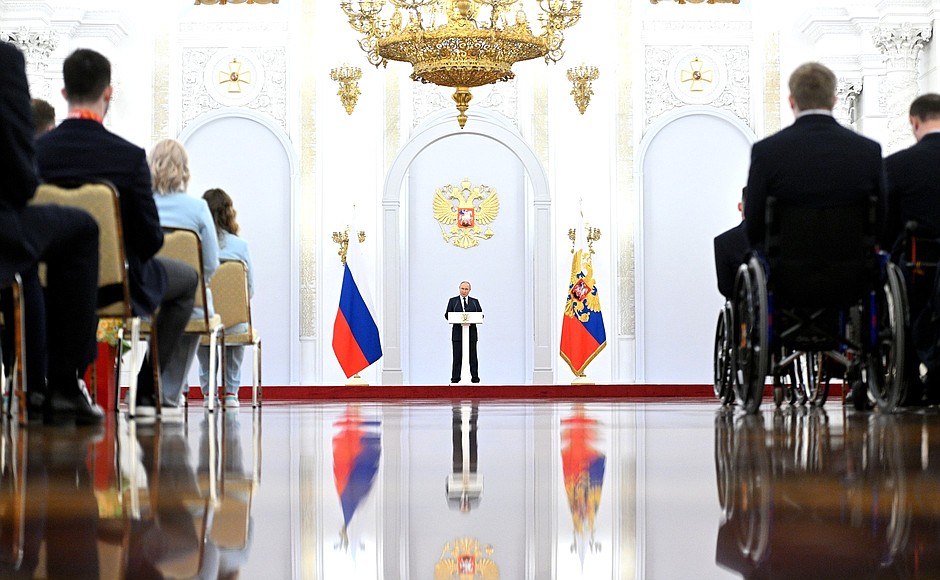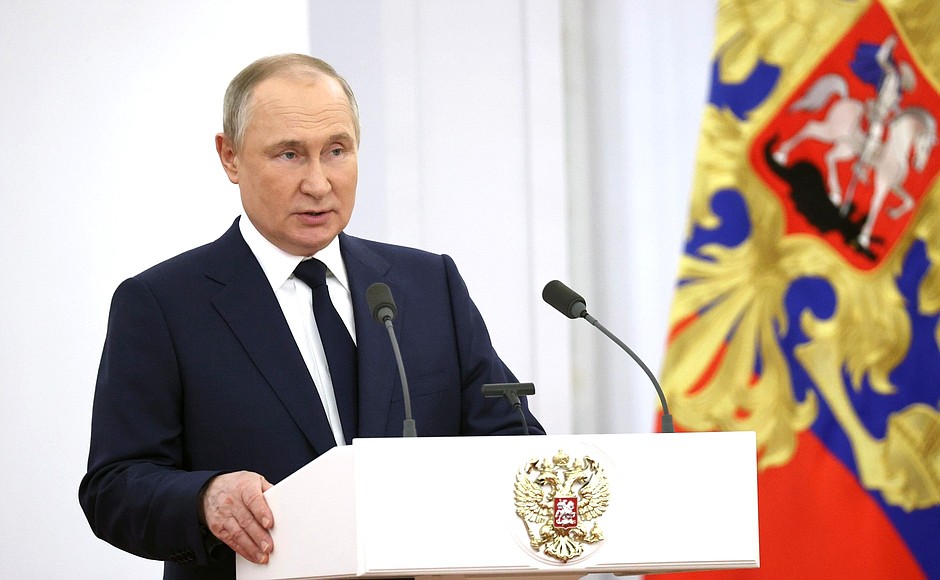Before the meeting, Vladimir Putin presented state decorations to the gold medallists of the Beijing 2022 Winter Olympics.
* * *
President of Russia Vladimir Putin: Friends, good afternoon,
I am delighted to see you all in this Kremlin hall.
I would like to begin by thanking you all – thank you for your hard work, for your achievements and your strong determination to win. Your victories in sports are certainly an inspiring, maybe even a super-inspiring example for many, for millions of people. It is highly significant for our entire society, for our youth, who are learning to be as resilient and dedicated as you are, as determined to persevere towards their goal and achieve the highest success, the highest results, to be the best.
See also
This is something that your mentors and coaches have largely taught to you to be; they were always there for you, supporting you, raising you along with your parents, and they are certainly proud of you now, probably even more proud than you are.
Making it through the most difficult qualifications for the Olympic and Paralympic Games is already impressive. The path towards this is always thorny and demands special talent and selfless work; each of you has negotiated that path worthily.
But of course, winning gold, the gold medal of the world’s biggest tournament, is the highest point in any athlete’s career. Once again, I congratulate the champions of Beijing – our brilliant figure skaters and excellent skiers. At the same time, I would like to note all the other medallists.
The second and third places on the Olympic podium are a huge victory as well, especially when it comes to long-awaited medals – such as the silver medal in ski jumping, something Russians have not won since 1968, or bronze in women's single sled (the last medal was won in 1980), or in the women's mogul, where they managed to repeat the achievement of 1994.
Alexandra Trusova’s silver medal stands tall as well. She was the first in the world to successfully land five quadruple jumps and opened a new page in the history of figure skating.
The men's speed skating team set another Olympic record, just one step away from the champion title. Overall, Russian skaters, including the short track, brought the national team two silver and two bronze medals.
Russian biathletes won four Olympic medals. We know that we can do more. The same applies to the men’s ice hockey team with the arrival of a new and promising generation.
There is a lot of potential in freestyle, which can be seen in the fact that our team, including both recognised masters of this sport and their worthy younger cohort, won three bronze medals.
It is my hope that snowboarder Victor Wild, who won a bronze medal in Beijing, will contribute to training future champions. I know that Victor announced his retirement from the sport, but his knowledge and experience are very important for the next generation.
I would like to especially emphasise our Paralympic athletes. You trained hard to show your best at the Beijing Paralympics, and to prove in an honest and open competition that you are the best and deserve this status. Of course, the way things played out does not stand up to any criticism. The fact that athletes from Russia and Belarus were prevented from competing was not only an outright violation of the fundamental principles of sport, but an act of open and, dare I say, cynical trampling of fundamental human rights.
All this is set forth in the Universal Declaration of Human Rights, which was adopted by the UN General Assembly back in 1948. This is not a question of the political, legal, or international status of the country the athletes represent. It is about the people, the athletes themselves. Their rights have been trampled upon. Our athletes suffered from discrimination on purely political grounds, based on their citizenship and ethnic background. This is something unimaginable, since it is completely at odds with the principles of the Olympic and Paralympic movements.
In fact, the “recommendations” took on the form of actual sanctions. Unfortunately, all this demonstrates the continuing drive towards subjecting sports to a business agenda, considering the growing dependence on sponsors – the money bags. This applies to both the Paralympic and the Olympic movements. Unfortunately, it goes without saying that dependence on corporations and subjecting Paralympic and Olympic sports to a business agenda is the path towards degradation.
Time and again, Russia has warned its partners against using double standards and the principle of collective responsibility in sports. Guided by the Olympic Charter, we kept telling them that the Games are a competition of athletes, not countries, and called for making sports politics-free, since politics reduces the values that international sports stand for to nothing, and it turns sports into a tool of manipulation.
Unfortunately, we have been witnessing cases which carry these actions and policies by our partners to the point of absurdity. What happened to our swimmer Yevgeny Rylov recently is a case in point. The International Swimming Federation suspended him for nine months from competition just because be attended a concert on the anniversary of Crimea’s reunification with Russia. This is total nonsense.
Such situations and approaches have been and remain a serious, major problem for both athletes and sports organisations, and for people who realise the huge importance of sports as a unique system for developing individuals and society and promoting ties and friendship between countries and peoples. All this is also obvious to Russia, to its citizens, and therefore we will fulfil all sports-related programmes, plans and commitments. We remain open to broad constructive cooperation with anyone who values the principles of sports and is loyal to sports.
This is borne out, for instance, in the Winter Games that Russia organised in Khanty-Mansiysk for the strongest Paralympians. Russian and Belarusian athletes are some of the best in the world. This is a fact beyond doubt. They won a third of all awards at the world championships held before the Games in Beijing. Armenia, Kazakhstan and Tajikistan also have strong teams that took part in our sports holiday.
Russia has the absolute long-standing lead in ski races and biathlon. Ivan Golubkov, Yekaterina Rumyantseva, Stanislav Chokhlayev and Anastasia Bagiyan confirmed this in Khanty- Mansiysk. The alpine skiers achieved their traditionally high results as well. I would like to congratulate Alexei Bugayev, Varvara Voronchikhina and Valery Redkozubov on their victories.
Our snowboarders Mikhail Slinkin and Alexei Petrov also won gold medals as did representatives of the Russian sledge hockey school, who invariably demonstrate a real team spirit and brilliant skills.
Winners and medallists of the Khanty-Mansiysk Games will receive bonuses corresponding to the traditional payment awards for achievements at the Paralympics.
Without exaggeration, the contribution of our athletes to the development and promotion of the Olympic and Paralympic Games is enormous. Today, I would like to congratulate you and the veterans of Soviet and Russian sports that are still with us; thank you for your outstanding successes and I wish you all the best.
The glorious traditions of Russian sport will be maintained and strengthened. We will do all we can to protect the rights of our athletes, and the competitions we hold will be open to all our friends and real partners, such as the World Olympians Association and the International Military Sports Council, which has supported Russian athletes.
There are no unfriendly countries for Russia in sports. We are happy to welcome anyone who stands for sports without discrimination or artificial barriers and for the sports ideals of justice, equality and fair competition.
I would like to wholeheartedly congratulate all of you once again and to wish you new victories. Thank you.
<…>
Vladimir Putin: In conclusion, I would like to add a few words to what our Paralympian has said. I believe that his main idea was that problems are being created for us and that we always become stronger when we overcome these problems.
We have everything we need for this. We have perfectly obvious competitive advantages connected with the size of our country, its scale, its various climate zones, its technological development and the growing government attention to sports, athletes and physical fitness.
I would like to point out again that your example is inspiring millions of people and encouraging government agencies and officials at all levels to respond appropriately to the requirements that appear in connection with your achievements and to join forces to explore new horizons, including in sports.
I would like to congratulate you once again on your achievements at the Olympic Games and to wish every success to our Paralympians. We will do everything I have mentioned here, which is what we will be talking about right now at the Presidential Council for the Development of Physical Culture and Sport.
Thank you once again for your achievements, and all the best.
(The National Anthem of Russia plays.)

